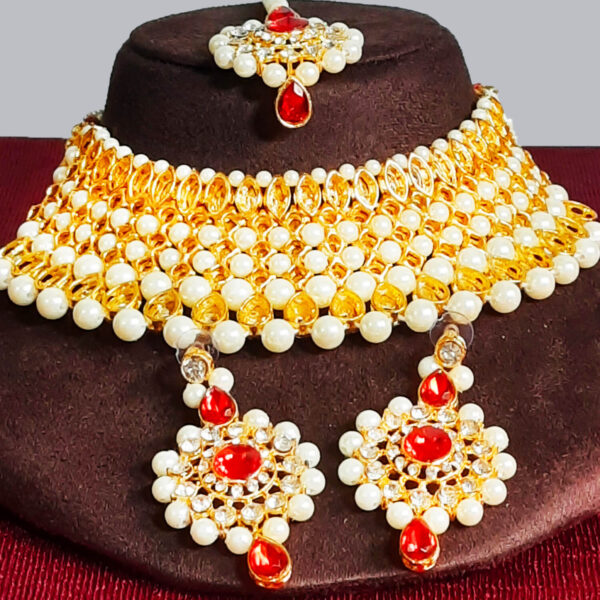Artificial jewellery, whether it’s made of metal alloys, beads, or adorned with American Diamonds, adds a touch of glamour to our everyday outfits. However, with regular wear, these pieces can lose their luster. The good news is that you don’t need fancy cleaners or professional services to keep your artificial jewellery looking as good as new. In this comprehensive guide, we’ll explore easy and effective ways to clean your artificial jewellery at home, ensuring they shine bright for years to come.
Understanding Your Jewellery
Identifying Materials: Know What You’re Working With
Before diving into the cleaning process, it’s crucial to identify the materials used in your artificial jewellery. Different materials require different cleaning methods to avoid damage.
- Metal Alloys: Understand the composition of metal alloys used in your jewellery, as certain metals may tarnish more easily than others.
- Beaded Jewellery: Recognize the types of beads used, such as glass, plastic, or wood, to choose appropriate cleaning methods.
- Checking for Coatings and Finishes
Some artificial jewellery pieces come with protective coatings or finishes to enhance their appearance and durability. It’s essential to be aware of these coatings to avoid inadvertently damaging them during the cleaning process.
- Gold or Silver Plating: If your jewellery has gold or silver plating, take extra care not to use abrasive materials that may scratch or wear away the plating.
- Clear Coats: Identify any clear coatings that may be present on your jewellery, as these coatings protect against tarnishing and should be preserved.
Basic Cleaning Methods
Gentle Soap and Water Bath
For most artificial jewellery, a simple soap and water bath is a safe and effective cleaning method. This method is suitable for a wide range of materials, including metal alloys, beads, and non-porous stones.
- Fill a Bowl with Warm Water: Use lukewarm water to create a gentle cleaning solution.
- Add Mild Soap: Add a few drops of mild dish soap to the water and mix until it forms suds.
- Soak and Gently Scrub: Submerge your jewellery in the soapy water and let it soak for a few minutes. Use a soft-bristled toothbrush or a cloth to gently scrub away dirt and grime.
- Rinse Thoroughly: Rinse the jewellery under running water to remove any soap residue.
Vinegar and Baking Soda Solution
For tougher stains or tarnished metal jewellery, a vinegar and baking soda solution can work wonders. This method is particularly effective for metal alloys like brass or copper.
- Create a Paste: Mix equal parts of baking soda and white vinegar to form a paste.
- Apply and Scrub: Apply the paste to the jewellery, focusing on tarnished areas. Allow it to sit for 10-15 minutes, then gently scrub with a toothbrush.
- Rinse and Dry: Rinse the jewellery thoroughly under running water to remove the paste, and pat it dry with a soft cloth.
Specialized Cleaning Methods
Toothpaste for Stubborn Stains
Toothpaste isn’t just for your teeth – it can be an effective cleaner for artificial jewellery, especially for removing stubborn stains or discoloration.
- Choose a Non-Gel Toothpaste: Opt for a plain, non-gel toothpaste without abrasive additives.
- Apply and Rub: Dab a small amount of toothpaste onto the jewellery and gently rub it in with a soft cloth or toothbrush.
- Rinse and Dry: Rinse the jewellery thoroughly and pat it dry to reveal a refreshed shine.
Polishing Cloth for a Finishing Touch
After the basic cleaning, using a polishing cloth can add that extra gleam to your jewellery, making it look as good as new.
- Select a Microfiber Polishing Cloth: Choose a soft, microfiber cloth designed for jewellery polishing.
- Gently Buff: With light pressure, buff your jewellery with the polishing cloth, focusing on areas that may need an extra shine.
- Inspect for Residue: Ensure there is no residue left on the jewellery after polishing.
Avoiding Harsh Chemicals
While it might be tempting to use strong chemicals for a quick fix, it’s crucial to avoid harsh substances that can damage your artificial jewellery.
- Avoid Acetone and Alcohol: Harsh solvents like acetone or alcohol can strip away protective coatings and damage certain materials.
- Say No to Abrasives: Steer clear of abrasive materials such as baking powder or toothpaste with gritty additives, as they can scratch and dull the surface.
- Test in an Inconspicuous Area: Before using any cleaning method, test it in a small, inconspicuous area to ensure it won’t harm your jewellery.
Storage and Maintenance Tips
Proper Storage to Prevent Tarnishing
Prevention is key when it comes to maintaining the shine of your artificial jewellery. Proper storage can significantly extend the life and beauty of your pieces.
- Use Ziploc Bags: Store each piece in a separate Ziploc bag to prevent scratching and minimize exposure to air.
- Anti-Tarnish Strips: Consider adding anti-tarnish strips to your jewellery storage to absorb moisture and prevent tarnishing.
- Regular Maintenance Routine
Establishing a regular cleaning and maintenance routine can make a significant difference in the longevity of your artificial jewellery.
- Weekly Check: Set aside a few minutes each week to inspect your jewellery for any signs of tarnish, dirt, or damage.
- Prompt Cleaning: Address any issues promptly to prevent them from becoming more challenging to clean or causing permanent damage.
Conclusion
Keeping your artificial jewellery looking fabulous doesn’t have to be a daunting task. With the right knowledge and a bit of TLC, you can maintain the sparkle and allure of your favorite pieces from the comfort of your home. From gentle soap and water baths to specialized methods like vinegar and toothpaste, there’s a cleaning solution for every type of artificial jewellery. So, roll up your sleeves, gather your cleaning supplies, and let your jewellery shine bright once again! Remember, a little care goes a long way in preserving the beauty of your beloved accessories.

